

Feminist History of Philosophy. First published Fri Nov 3, 2000; substantive revision Mon May 7, 2007 The past twenty-five years have seen an explosion of feminist writing on the philosophical canon, a development that has clear parallels in other disciplines like literature and art history.
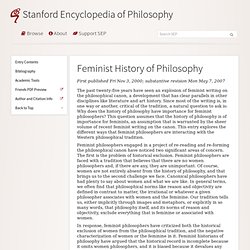
Since most of the writing is, in one way or another, critical of the tradition, a natural question to ask is: Why does the history of philosophy have importance for feminist philosophers? This question assumes that the history of philosophy is of importance for feminists, an assumption that is warranted by the sheer volume of recent feminist writing on the canon. This entry explores the different ways that feminist philosophers are interacting with the Western philosophical tradition. Feminist philosophers engaged in a project of re-reading and re-forming the philosophical canon have noticed two significant areas of concern.
The Essential Feminist Reader (Modern Library Classics) (9780812974607): Estelle Freedman. Denise Riley. Denise Riley (born 1948, Carlisle) is an English poet and philosopher who began to be published in the 1970s.
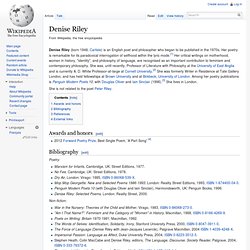
Her poetry is remarkable for its paradoxical interrogation of selfhood within the lyric mode.[1] Her critical writings on motherhood, women in history, "identity", and philosophy of language, are recognised as an important contribution to feminism and contemporary philosophy. She was, until recently, Professor of Literature with Philosophy at the University of East Anglia and is currently A. D. Heidi Hartmann. Heidi Hartmann (born 1945) is a feminist economist and the founder of the Institute for Women's Policy Research (IWPR), a scientific research organization formed to meet the need for women-centered, public policy research.
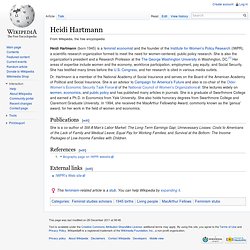
Rosa Luxemburg. Rosa Luxemburg (also Rozalia Luxenburg; Polish: Róża Luksemburg; 5 March 1871[1] – 15 January 1919) was a Marxist theorist, philosopher, economist and revolutionary socialist of Polish Jewish descent who became a naturalized German citizen.
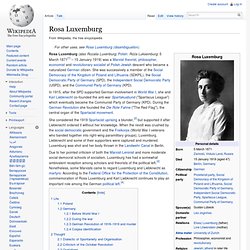
Angela Davis. Angela Yvonne Davis (born January 26, 1944) is an American political activist, scholar, and author.

She emerged as a nationally prominent counterculture activist and radical in the 1960s, as a leader of the Communist Party USA, and had close relations with the Black Panther Party through her involvement in the Civil Rights Movement despite never being an official member of the party. Prisoner rights have been among her continuing interests; she is the founder of Critical Resistance, an organization working to abolish the prison-industrial complex. Selma James. Selma James (born 15 August 1930), is a co-author of the women's movement classic The Power of Women and the Subversion of the Community (with Mariarosa Dalla Costa), co-founder of the International Wages for Housework Campaign and coordinator of the Global Women's Strike.[1] Socialist activist[edit] Selma James (née Deitch)[2] was born in Brooklyn, New York, in 1930.
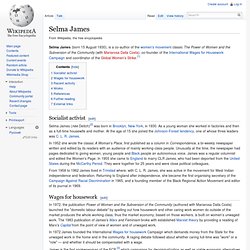
As a young woman she worked in factories and then as a full-time housewife and mother. Mariarosa Dalla Costa. Combahee River Collective. Beginnings in the NBFO[edit] Author Barbara Smith and other delegates attending the first (1973) regional meeting of the National Black Feminist Organization in New York provided the groundwork for the Combahee River Collective with their efforts to build a NBFO Chapter in Boston.[6][7] In her 2001 essay "From the Kennedy Commission to the Combahee Collective", historian and African American Studies professor Duchess Harris states that, in 1974 the Boston collective "observed that their vision for social change was more radical than the NBFO", and as a result, the group chose to strike out on their own as the Combahee River Collective.[8] Members of the CRC, notably Barbara Smith and Demita Frazier, felt it was critical that the organization address the needs of Black lesbians, in addition to organizing on behalf of Black feminists.[8] Naming the Collective[edit] Developing the Statement[edit] Process of writing the Statement[edit]
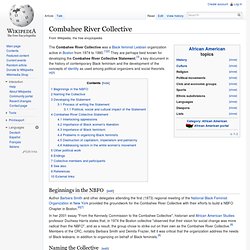
Caliban and the witch - Silvia Federici. Silvia Federici. Federici being interviewed at MACBA museum in Barcelona.
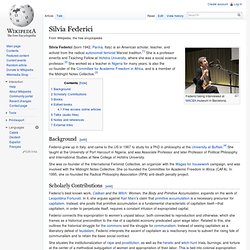
Materialist Feminism - The Feminist eZine. Toronto Website Design & Toronto SEO Understanding Materialist Feminism By Suzanne MacNevin - 2007.
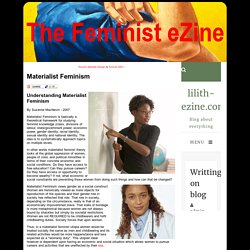
Materialist Feminism is basically a theoretical framework for studying feminist knowledge (class, divisions of labour, state/government power, economic power, gender identity, racial identity, sexual identity and national identity. The idea is to systematically approach topics on multiple levels. Hazel Carby. Hazel V.
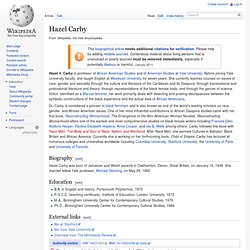
Carby is professor of African American Studies and of American Studies at Yale University. Before joining Yale University faculty, she taught English at Wesleyan University for seven years. Cultural Theory: Materialist Feminism (part 1) Materialist feminism: a reader in class, difference, and women's lives - Rosemary Hennessy, Chrys Ingraham. Material feminism. Material feminism highlights capitalism and patriarchy as central in understanding women’s oppression. Marxist / Materialist Feminism. Introduction "Marxist Feminism / Materialist Feminism" by Martha E. Gimenez [Copyright Martha E.